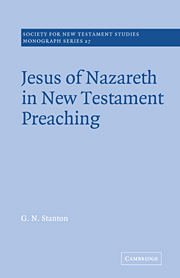Book contents
- Frontmatter
- Contents
- Preface
- Abbreviations
- Introduction
- 1 Jesus of Nazareth in missionary preaching: Luke's view
- 2 Luke's presentation of Jesus in his Gospel
- 3 Pre-Lucan traditions about Jesus in the speeches in Acts
- 4 Jesus in Paul's preaching
- 5 The gospels and ancient biographical writing
- 6 Jesus in the gospel traditions
- 7 The gospel traditions in the early church
- Conclusions
- Index of passages cited
- Index of authors
- General Index
- Frontmatter
- Contents
- Preface
- Abbreviations
- Introduction
- 1 Jesus of Nazareth in missionary preaching: Luke's view
- 2 Luke's presentation of Jesus in his Gospel
- 3 Pre-Lucan traditions about Jesus in the speeches in Acts
- 4 Jesus in Paul's preaching
- 5 The gospels and ancient biographical writing
- 6 Jesus in the gospel traditions
- 7 The gospel traditions in the early church
- Conclusions
- Index of passages cited
- Index of authors
- General Index
Summary
Several unfashionable suggestions have been made in this book, one of the most important of which is that the early church was interested in the past of Jesus.
This conclusion is supported by several lines of evidence. Neither the speeches in Acts nor Paul's epistles suggest that early Christian communities set no store by the life and character of Jesus. When set alongside roughly comparable material, the ‘historical’ and ‘biographical’ perspective of the gospels is striking; their rich portrait of Jesus cannot be brushed aside either as a misunderstanding of their intention or with the dictum ‘the gospels are not biographies’. Jesus' words, actions and persons are very closely related; already in his own lifetime his conduct, claims and unimpressive background drew critical questioning. If we accept that traditions about the proclamation of Jesus were used in the early church to proclaim him, similar questions about Jesus were bound to arise: Who was this Jesus about whom so much is claimed? Why was he rejected and crucified? If the early church was uninterested in the past of Jesus, the emergence of the gospels becomes a puzzle. For, in spite of all possible qualification, the gospels, including John, look very much like lives of Jesus.
R. Bultmann's insistence that the kerygma of the early church was not concerned with more than the mere Dass of the historical existence of Jesus is no longer accepted without modification, even by scholars whom he has deeply influenced.
- Type
- Chapter
- Information
- Jesus of Nazareth in New Testament Preaching , pp. 186 - 192Publisher: Cambridge University PressPrint publication year: 1975



